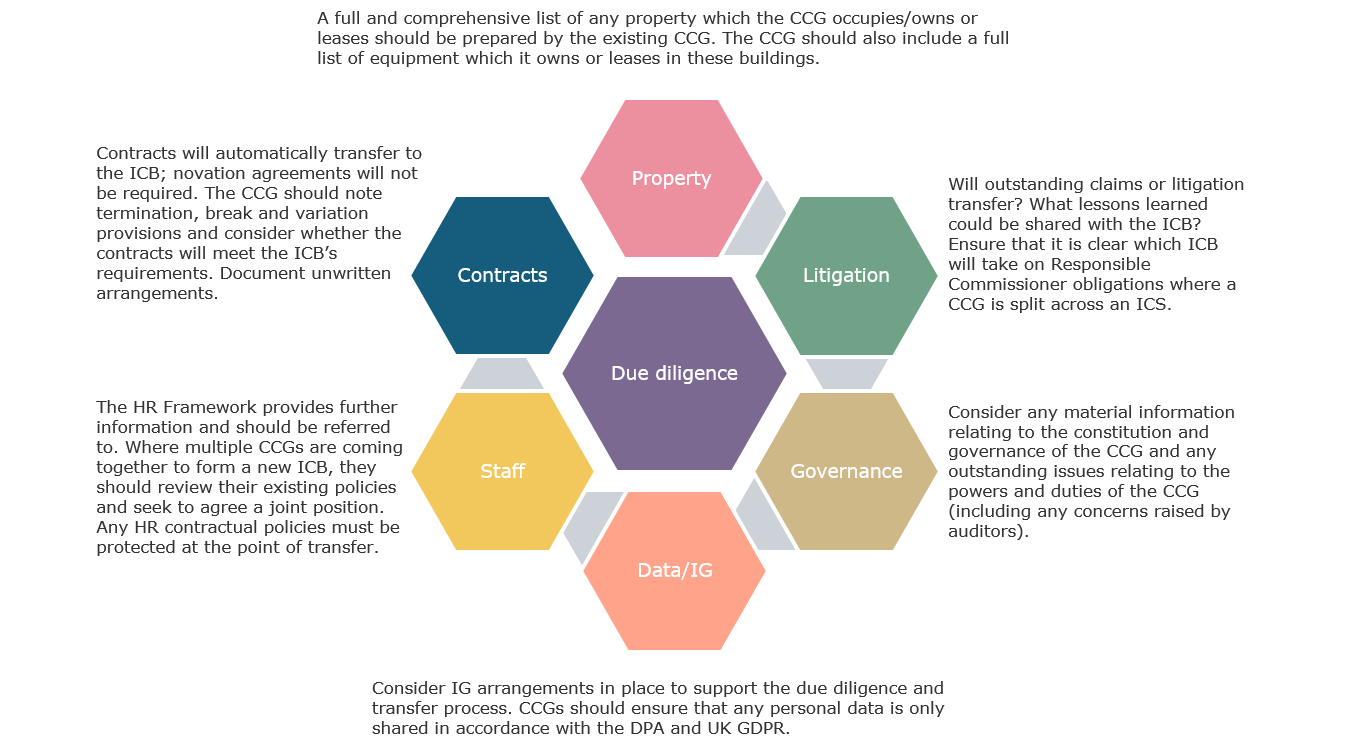Once the Health and Care Bill 2021 receives royal assent, Clinical Commissioning Groups (CCGs) will be abolished and all statutory functions, along with assets, liabilities and many CCG employees, will transfer to Integrated Care Boards (ICBs). The aim is for this transition to take place on 1 April 2022.
While the transfer will be done by statutory transfer order, CCGs will still need to carry out appropriate due diligence in connection with the transfer in order to understand which assets and liabilities are being transferred and to identify any issues at an early stage.
In this briefing, we focus on the key areas of due diligence to be considered by CCGs and practical steps they should start to take now.
Preparation is Key
NHS England and Improvement (NHSEI)’s ICS implementation guidance: Due diligence, transfer of people and property from CCGs to ICBs and CCG close down, requires CCG accountable officers to provide written assurance of completed due diligence to NHSEI and, if appropriate, the chief executive (designate) by early March 2022. CCGs should already have plans in place for this due diligence to commence in order to allow a 6 month period prior to the transfer.
The enormity of a due diligence exercise like this is very often underestimated. CCGs should be realistic with timelines and:
- Set up a well-structured process as early as possible. A due diligence spreadsheet has been published on the FutureNHS collaborative workspace, which should be used as a starting point (CCG Close Down and ICB Establishment Due Diligence Checklist);
- Start dialogues with individual colleagues and departments to set expectations, particularly in terms of scope and timescales, and divide tasks - ideally setting up an internal project management team to lead on this exercise; and
- Recognise the value of corporate memory - CCG arrangements, contracts etc are not always recorded in writing and it is vital that these arrangements are understood and documented. Employees that have been with the CCG for a long time, and who may not be transferring to the ICB, will have a lot that they can contribute to this exercise.
Key Areas of Focus
Level of due diligence
The level and complexity of due diligence will vary depending on the extent to which the existing CCG(s) “map” over to the ICS. Where the boundary of a CCG is the same as the boundaries of the new ICS, the transfer scheme will be a straightforward “lift and shift” arrangement.
Where there are no ICS boundary changes but there are multiple CCGs within an ICS, there will be additional complexity and need for coordination. CCGs will need to work together to consider how headquarters, operational policies, third-party supplier contracts, processes, assets and liabilities are to be consolidated.
Where there are changes to existing ICS boundaries or CCGs are “split” between ICSs, a full “lift and shift” will not be possible. In these circumstances, detailed lists will be required to confirm specific staff, property and liabilities that transfer to each ICB (and included in a schedule to the transfer scheme). This will require joint working and information sharing between CCGs to ensure there are no gaps or duplication.
How DACB can support CCGs with this process
We have vast experience with managing due diligence processes in large-scale NHS transitions.
We can support you as follows:
- Review key contracts and carry out contract due diligence to identify material contracts and any particular key terms and risks, including liability and indemnity provisions and termination/break rights (flagging any contracts that terminate just before or just after transition, do these need extending?). It is vital that any undocumented or verbal contractual arrangements are recorded. We can support with preparing these contracts and provide templates for you to work from;
- Review and support you with project management as you complete the due diligence checklist;
- Review premises arrangements and advise you in relation to any liabilities and constraints that may impact on your continuing occupation or future development plans;
- Help you talk to staff about the transfer to ICBs to ensure you comply with your consultation requirements and/or prepare an executive summary or checklist setting out the process to follow; and
- Consider your existing Responsible Commissioner obligations and any disputes with other commissioners relating to these to ensure that there are no gaps for service users going forward.
It is common for organisations to undertake their own financial, operational and clinical due diligence but this may not always be a substitute for the legal ‘deep dive’ that is required for projects of this nature. CCGs should consider giving their legal team early access to project teams and planning to ensure a seamless transaction. We can provide legal review and sign-off of the due diligence exercise before submission of written assurance to NHSEI.





